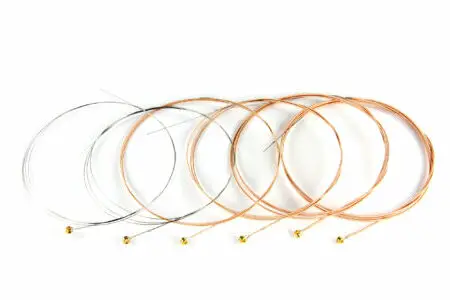Metal guitar strings can be recycled. Many recycling facilities will accept them along with other types of metal for recycling.
However, it’s important to note that guitar strings are often made from various metals, so they may need to be separated before they can be recycled. Suppose you’re unsure how to recycle guitar strings in your area. In that case, you can try contacting your local waste management company or a recycling facility to ask about the best way to dispose of them.
How to Recycle Guitar Strings
There are a few steps you can take to recycle guitar strings:
- Remove the strings from your guitar. If you’re replacing the strings on your guitar, remove the old ones and set them aside for recycling.
- Separate the strings by type. Guitar strings are often made from a combination of different metals, such as steel, nickel, and copper. To recycle them, you’ll need to separate the strings by type of metal.
- Find a recycling facility that accepts metal. Many recycling facilities accept metal of all types, including guitar strings. You can search online or call around to find a facility near you that will take them.
- Bring the strings to the recycling facility. Once you’ve found a facility that will accept your guitar strings, bring them for recycling, some facilities may require you to sort the strings by metal type, so be prepared to do that if necessary.
- Dispose of any packaging or other materials. If your guitar strings come in packaging, recycle or dispose of them.
By following these steps, you can help to ensure that your old guitar strings are recycled and repurposed rather than ending up in a landfill.

The Materials Used in Guitar Strings
Guitar strings are typically made from metals, including steel, nickel, and copper. The specific type of metal used in a particular set of strings can affect the sound and playability of the guitar.
Steel strings are the most common type of guitar string, and they are used on both acoustic and electric guitars. They are known for their bright, clear tone and are often used in various musical genres, including rock, pop, and country.
Nickel strings are also commonly used on electric guitars. They have a warm, mellow sound and are often preferred by jazz and blues musicians.
Copper strings are less common but are also sometimes used on electric guitars. They are known for their soft, warm tone and are often used in conjunction with other strings to create a unique sound.
In addition to these metals, guitar strings may contain other materials, such as coatings or winding materials, to improve their performance and durability.
Separating Guitar Strings by Metal Type
To recycle guitar strings, separating them by metal type is essential. This is because different metals have different recycling processes and may need to be recycled separately.
Here are a few steps you can follow to separate your guitar strings by metal type:
- Gather all of your used guitar strings in one place. This could include strings from multiple guitars or sets of strings.
- Inspect the strings to determine their metal type. Some strings may be marked with the kind of metal they are made from, while others may not be. If you’re unsure what metal a string is made from, you can try using a magnet to determine if it is steel (which is magnetic) or another metal (which is not).
- Sort the strings into piles based on metal type. You can use separate containers or bags to hold the strings of each metal type.
- Double-check your sorting. Make sure you have accurately separated all of the strings by metal type.
By separating your guitar strings by metal type, you can help to ensure that they are adequately recycled and repurposed into new products.
Disposing of Packaging and Other Materials
In addition to recycling the guitar strings is also essential to dispose of any packaging or other materials that come with them in an environmentally responsible way. This can help to reduce waste and minimize the impact on the environment.
Here are a few steps you can take to dispose of packaging and other materials:
- Check the packaging for recycling instructions. Some packaging may be marked with symbols or labels indicating that it can be recycled. Follow any instructions provided to determine the best way to recycle the packaging.
- Look for a recycling facility that accepts your packaging type. Suppose the packaging is not marked for recycling, or you are unsure how to recycle it. In that case, you can try contacting your local waste management company or a recycling facility to ask about the best way to dispose of it.
- Recycle or dispose of other materials. If you have any other materials, such as old guitar cases or picks, consider recycling or disposing of them in an environmentally responsible way.
By properly disposing of packaging and other materials, you can help to reduce waste and protect the environment.
Can You Throw Away Guitar Strings?
Technically, you can throw away guitar strings, but it is generally not the most environmentally responsible option. This is because guitar strings are made from metal, which can be recycled and repurposed into new products. Throwing away guitar strings means these valuable resources will be sent to a landfill, which will take up space and potentially release harmful substances into the environment.
Instead of throwing away guitar strings, it is generally better to recycle them. Many recycling facilities will accept guitar strings and other types of metal. By recycling your guitar strings, you can help to reduce waste and protect the environment.
If you cannot recycle your guitar strings, you can consider other options for disposing of them. For example, you could donate them to a music store or school music program or try selling them to a collector or other musician.
Conclusion
Recycling guitar strings is a simple and effective way to reduce waste and protect the environment. Guitar strings are made from metal, a valuable resource that can be recycled and repurposed into new products. By separating your guitar strings by metal type and bringing them to a recycling facility, you can help ensure that these resources are used most efficiently and sustainably.
Additionally, it is essential to dispose of any packaging or other materials in an environmentally responsible way, such as by recycling or reusing them. Recycling guitar strings is a small but essential step everyone can take to help protect the planet.

